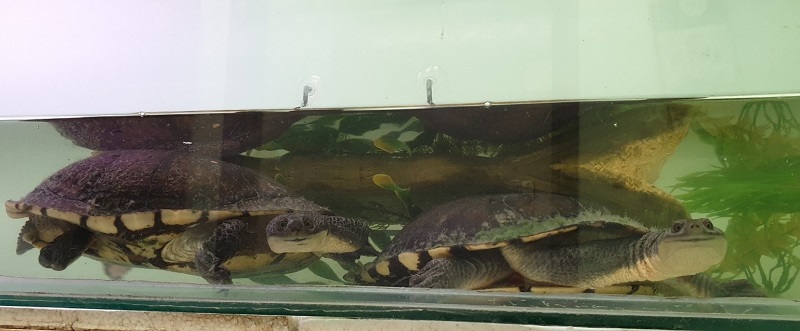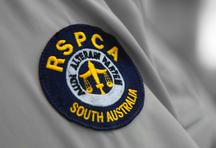Reg and Ralph paddling towards better life – New home sought for turtles found injured and abandoned in plastic tubs
May 19, 2020Anyone seeking a pet with a long lifespan, engaging personality and entertaining behaviour may like to look beyond common domestic pets. Two eastern long-necked turtles that survived a rough start to life are now in RSPCA South Australia’s care and in need of a new home.
One of the turtles is missing both hind feet, while the other one is missing one hind foot. The cause of these injuries is unknown, but it is possible that another turtle has bitten the feet off – a shocking thing to occur, but not uncommon when turtles are crowded together in substandard conditions.
Happily both turtles, named Reg and Ralph by their RSPCA carers, have now recovered and are available to adopt.
Eastern long-necked turtles are a carnivorous species found throughout south-eastern Australia. Although they do not require a wildlife permit to keep, RSPCA South Australia’s reptile expert Craig Dawe warns that turtles are not low maintenance pets.
“These two turtles were found crammed inside plastic tubs containing dirty water on the back porch of a vacant house,” Mr Dawe said.
“One of our inspectors rescued them after receiving a tip-off from police.
“They weren’t in a good way when they came to us last week, and a third turtle at this address remains in veterinary care with significant damage to his shell.
“Luckily, these two turtles are now doing well and we’re hoping there’s a potential adopter out there who knows how to keep them happy and in good health – or is prepared to put in the time to research their needs.
“We also want them to have a forever home, remembering that these turtles can live for up to 50 years.”
Key factors in caring for eastern long-necked turtles include:
Quality housing – many turtles are active swimmers, so the bigger the better. A large aquarium or a large indoor or outdoor pond are options.
A diet consisting of specially formulated turtle feed which can be supplemented with food they would natural eat in the wild – eg: small freshwater fish such as whitebait and crabs
A warm, light-filled platform to bask on, large enough so turtle can completely climb out of the water.
According to Mr Dawe, failure to maintain water quality and provide opportunities for exposure to ultraviolet light are two common causes of ill-health in pet turtles.
“Like all reptiles, turtles need different temperature zones to regulate their body temperature,” Mr Dawe said.
“You may need a submersible aquarium heater to maintain the optimum range of 20 to 28 degrees, and you definitely should use an aquarium thermometer to regularly check water temperature.”
“You may need an aquarium heater to keep the water within that optimum range.”
(For more information on caring for turtles – http://turtlesaustralia.org.au/page-1515614)
While they are a higher maintenance pet than some animals, Mr Dawe insists turtles are worth the effort.
“Turtles definitely fit the unusual pet category and they are incredibly entertaining, especially at feeding time.”

Reg and Ralph enjoying life in cleaner, more spacious accommodation while they wait for a permanent home.



